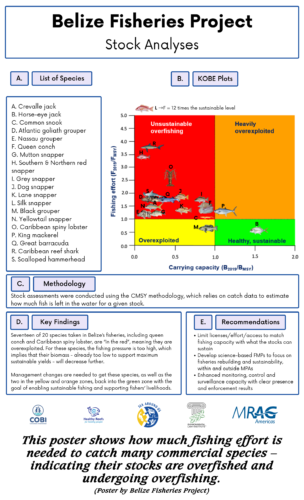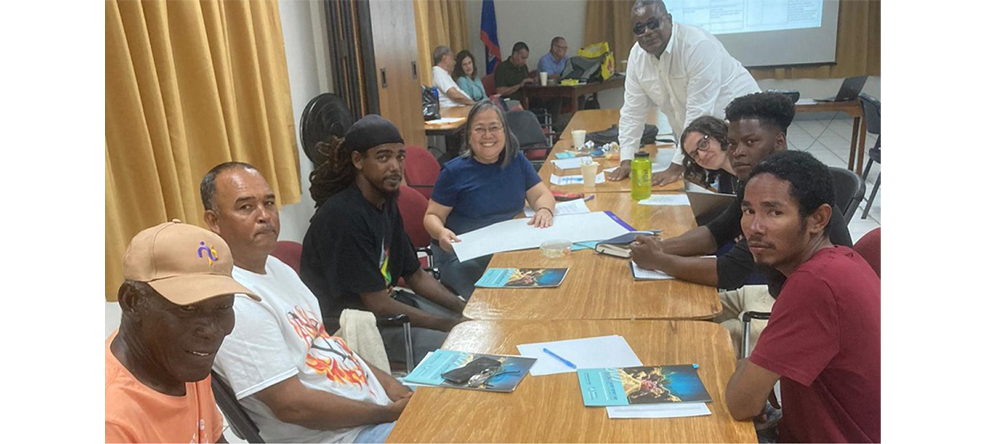Photo: Sea Around Us project manager, Dr. Maria ‘Deng’ Palomares, with Belizean fishers.
Belizean fishers to present 10-point priority output demands to the Government of Belize to save Belize’s declining fisheries
by Marco Lopez
BELIZE CITY, Thurs. Feb. 8, 2024
Conch and lobster are overfished and nearing depletion. This is according to findings presented in two sets of workshops across the Jewel in June and December of 2023. This scientific data analyzed and compiled through a partnership of the Belize Fisheries Project, Comunidad y Biodiversidad (COBI), the Environmental Law Institute, the Healthy Reefs for Healthy People Initiative, and MRAG Americas – has corroborated the real-world experiences of fisherfolk on the waters.
It solidifies and gives further legitimacy to the cry of the Belize Federation of Fishers (BFF) – that the Belize fisheries industry is in crisis.
The call from the BFF and wider fisherfolk community is for the authorities to put in place measures to salvage and preserve the industry for future generations. Nigel Martinez, Director of the BFF told AMANDALA in an interview today that the fisherfolk played a key role in corroborating the findings in the stock assessments conducted.
“They recognized, agree (with the findings) – they knew that this was coming,” Martinez pointed out.
Despite this, he shared that they have received pushback from the Fisheries Department. The department is conducting its own stock assessment with the help of a $7 million loan from the International Development Bank (IDB). Fisheries administrator, Rigoberto Quintana referred to the draft findings of the Summit Foundation disseminated by the BFF following June 2023, as “highly questionable.”
Martinez of the BFF suggested that 65% of the $7 million loan will go towards this work within the department. He said, in many instances, it duplicates work already conducted on the ground with international conservation partners and grassroots fisherfolk community members.
The article published by Sea Around Us, points out that the stock assessment they conducted was done using CMSY++ methodology for 18 fish and invertebrate species. This methodology is considered the “gold standard” in predicting sustainable fisheries catches, according to a paper published in the journal Acta Ichthyologica et Piscatoria.
Martinez outlined that the fisherfolk continue to see the “writing on the wall”, and are now taking steps to keep the fishing community in line by implementing a code of conduct for all fishers in Belizean waters.
Provisions to ensure sustainable fishing are to be practiced by each boat – with implementation from associations, fishing communities, and partners – will be included in this code of conduct.
Immediate action by the government is also a demand from the fishing community. Martinez shared that the BFF will release a 10-point priority output list to the government within the coming days. These are the ten major areas identified as challenges by the fisherfolk and stock assessment data – and the collective and collaborative solutions put forward by the fisherfolk during the workshops.
Hinting at some of these points, Martinez shared that fisherfolk need an endowment fund, reform of the licensing system, a limit on catch quantity, and an apprenticeship program to enter new fisherfolk into the industry.
The stock assessment conducted by Sea Around Us found that most species are unsustainably fished. Independent studies from the Healthy Reefs Initiative found 60 percent decline in grouper and snappers. Unsustainable trends for conch and lobster across selected fishing grounds were documented by marine ecologist Alexander Tewfik and colleagues.

A primary solution put forward by the fisherfolk participants of the workshops included reform to reduce the number of licenses. They suggest the implementation of different licenses for non-citizens and citizens who make their living primarily from commercial fishing, auditing the existing licenses, and removing old or duplicated licenses.
Also, assessing each of the managed-access fishing zones to determine the number of fishers that the zone can support, and adjusting licenses accordingly, are some recommendations.
We reached out to the Fisheries Department’s Fisheries Administrator, Rigoberto Quintana, and other staff at their work emails to ask for responses to these findings and comments from the BFF, but we have received no reply.
We first reported on the series of workshops held with fisherfolk across Belize in association with the Summit Foundation in July 2023 in an article entitled “Fisheries in Crisis”. Following the publication, the Fisheries Department released a statement denouncing the report and the comments made by the executive leadership of the BFF.
At the time, the department called the statement made by the BFF “irresponsible and baseless,” despite being drawn from science-backed stock assessment data and corroborating experiences from fisherfolk identified in workshops in June 2023.
The December 2023 workshops, from which this most recent report was published on 19th January 2024, again present similar data on the state of fisheries in Belize, and corroboration from fisherfolk that the situation has worsened in six months between one workshop and the other.

